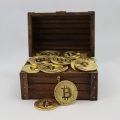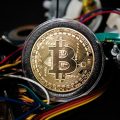Asset tokenization, a revolutionary concept made possible by blockchain technology, has been gaining momentum in recent years. This article explores the role of Ravencoin (RVN) in asset tokenization, shedding light on how this innovative cryptocurrency is shaping the future of digital assets. Additionally, for those interested in exploring user-friendly platforms for managing digital assets, the https://bit-qt.app/ provides a seamless experience, offering a range of features for asset tokenization and management.
Definition of Asset Tokenization
Asset tokenization involves converting real-world assets, such as real estate, art, or intellectual property, into digital tokens on a blockchain. These tokens represent ownership or rights and can be easily traded, transferred, or divided among multiple owners.
The Rise of Cryptocurrency and Blockchain
Cryptocurrencies like Bitcoin and Ethereum have paved the way for blockchain technology’s widespread adoption. The transparency, security, and decentralization offered by blockchain have created a fertile ground for asset tokenization.
The Need for Efficient Asset Transfer and Ownership
Traditional asset transfer and ownership processes are often cumbersome, involving intermediaries, paperwork, and delays. Asset tokenization aims to streamline these processes, making them more efficient and accessible to a broader range of investors.
Understanding Ravencoin (RVN)
History and Background
Ravencoin was launched in 2018 by a team led by Bruce Fenton. It was specifically designed for asset tokenization and has its roots in the Bitcoin codebase, inheriting its security features and robustness.
Key Features and Characteristics
- Asset Creation
Ravencoin allows users to create their own tokens representing ownership of real-world assets. This feature is at the heart of its asset tokenization capabilities.
- Security and Decentralization
RVN’s security mechanisms are similar to Bitcoin, with a strong focus on decentralization. This ensures the safety and integrity of tokenized assets.
- Compatibility with Bitcoin
RVN is designed to work seamlessly with Bitcoin, making it easier for users familiar with Bitcoin to understand and use RVN.
Community and Development
Ravencoin has a dedicated and active community of developers and supporters who continually improve the platform. This strong community support is essential for the growth and development of RVN.
Asset Tokenization Explained
What is Asset Tokenization?
Asset tokenization involves converting physical or digital assets into blockchain tokens. These tokens represent ownership, value, or rights, and their ownership is recorded on a blockchain.
Benefits of Tokenizing Assets
- Liquidity
Tokenized assets can be easily bought, sold, and traded 24/7, increasing their liquidity compared to traditional assets.
- Fractional Ownership
Tokenization allows for the division of assets into smaller, more affordable units, enabling a wider range of investors to participate.
- Security and Transparency
Blockchain provides a transparent and immutable ledger, reducing the risk of fraud and ensuring accurate ownership records.
Ravencoin’s Role in Asset Tokenization
RVN as a Platform for Asset Tokenization
Ravencoin was specifically created to facilitate the tokenization of assets. Its user-friendly interface and robust security make it an ideal choice for asset owners and developers.
The Process of Creating and Issuing Tokens on Ravencoin
Token creation on RVN is straightforward. Users can issue new tokens, define their properties, and distribute them to investors or stakeholders.
Examples of Asset Tokenization Projects on RVN
- Real Estate
Ravencoin has been used to tokenize real estate properties, allowing property owners to offer fractional ownership to a broader group of investors.
- Collectibles
Rare collectibles, such as artwork, vintage cars, and memorabilia, have been tokenized on the Ravencoin blockchain, making them more accessible to enthusiasts and investors.
- Intellectual Property
Creators and artists can use RVN to tokenize their intellectual property, ensuring fair compensation for their work and protecting their rights.
Use Cases and Adoption
Industries Benefiting from RVN-Based Asset Tokenization
Various industries, including real estate, finance, art have embraced RVN for asset tokenization due to its security and ease of use.
Case Studies of Successful Implementations
TZero’s Partnership with RVN
TZero, a leading blockchain-based securities exchange, partnered with Ravencoin to enhance its tokenization capabilities, further validating RVN’s role in asset tokenization.
Challenges and Considerations
Regulatory Compliance
Asset tokenization must comply with varying regulations worldwide. Navigating these regulatory challenges is essential for the success of RVN-based projects.
Security and Custody
Protecting digital assets and ensuring secure custody solutions are critical, as the loss of private keys can result in the loss of tokenized assets.
Scalability Issues
As more assets are tokenized on RVN, scalability may become a concern. Solutions for scalability need to be developed to accommodate growing demand.
Competition and Alternatives
RVN faces competition from other blockchain platforms specializing in asset tokenization. Understanding the competitive landscape is vital for RVN’s future success.
The Future of Ravencoin and Asset Tokenization
Predictions and Trends
The future of Ravencoin looks promising, with continued growth in asset tokenization across various industries.
Expanding Use Cases
RVN is likely to expand its use cases beyond its current applications, potentially tapping into new markets and asset types.
Potential Impact on Traditional Financial Systems
RVN and asset tokenization have the potential to disrupt traditional financial systems by providing more accessible and efficient ways to invest in and trade assets.
Conclusion
In conclusion, Ravencoin plays a pivotal role in the world of asset tokenization. Its user-friendly platform, security features, and active community make it a compelling choice for those looking to tokenize assets. As blockchain technology continues to evolve, RVN is poised to facilitate the transformation of the asset ownership landscape, providing increased liquidity, accessibility, and transparency for a wide range of assets.






